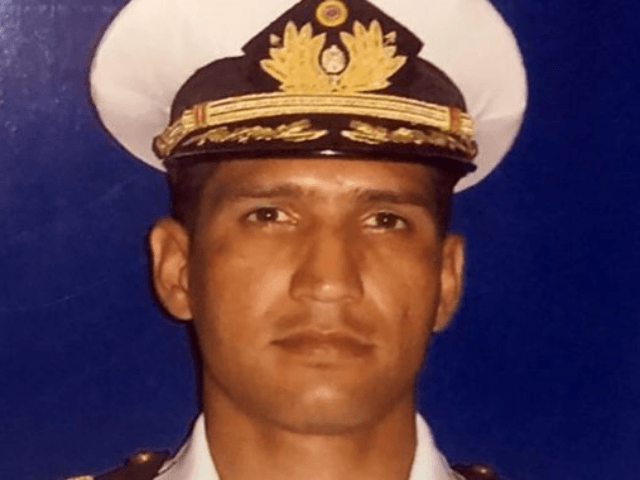The United States, most Latin American leaders, and some in Europe condemned the socialist regime in Venezuela following the death of Corvette Captain Rafael Acosta Arévalo, last seen weakened by torture into a wheelchair and capable only of saying the word “help.”
Acosta was being tried by dictator Nicolás Maduro’s court system for a variety of crimes of dissent including “terrorism,” “sedition,” and attempted assassination of Maduro himself. Maduro’s regime regularly charges dissidents, particularly those in the military, with crimes such as terrorism without presenting evidence. Acosta’s family say that he was not involved in any violent conspiracies, and was arrested and put on trial solely for opposing the socialist regime.
Human rights attorney Tamara Suju announced Acosta’s death on Saturday via Twitter, sharing his photo and noting that he was last seen alive in court on Friday. Acosta was arrested on June 21. She accused Venezuela’s General Directorate of Military Counterintelligence (DGCIM), the military intelligence agency in the country, of killing him.
“Yesterday, he arrived in court in a wheelchair, showing grave signs of torture. He did not speak, he only told his lawyer, ‘HELP.’ He did not hear or understand well,” Suju wrote. Acosta was in court for a preliminary hearing on his case.
#SOSVENEZUELA DGCIM asesina a punta de TORTURAS al Cap. D Corbeta Rafael Acosta Arévalo. Detenido el 26Jun. Ayer llegó a tribunales en silla de ruedas, presentando graves signos de TORTURAS. No hablaba, sólo pedía AUXILIO a su abogado. No entendía ni escuchaba bien. Le pedia pic.twitter.com/0wgshHlEam
— Tamara Suju (@TAMARA_SUJU) June 29, 2019
According to the Venezuelan media outlet Runrunes, Acosta could not move his hands or feet at the hearing. “Observers noted many lacerations on his arms, little sensibility in his hands, his feet were extremely swollen, and his nails were bloody and he had legions on his torso,” the outlet noted, citing witnesses at the hearing. He reportedly could not answer questions about his detention at the hearing and could barely speak. He reportedly nodded “yes” when asked if he was being tortured but could not communicate in words, other than the word “help.”
The judge presiding canceled the hearing because of Acosta’s state and ordered him moved to the medical wing in his prison. The judge announced his death on Sunday.
Waleska Pérez, Acosta’s wife, told journalist Carla Angola that the arrest on June 21 was abrupt, and that she was not told why Maduro’s forces arrested him. Instead, she, like the rest of the country, saw him at a press conference on June 26 accused of terrorism.
“Unfortunately, he did not agree with the government and they killed him,” Pérez said on Saturday. “They tortured him a lot, they tortured him so much that they killed him.”
The Maduro regime has offered conflicting stories for how Acosta died. When Pérez spoke on Saturday, the official story claimed that Acosta had thrown himself off a balcony, which Pérez rejected as a lie. Communications Minister Jorge Rodríguez later claimed that he died during his court hearing. The nation’s defense minister, Vladimir Padrino López, claimed that he died before he was presented to the court.
Maduro tasked Saab with an investigation into Acosta’s death, though many in the opposition and international community doubt that Maduro’s handpicked prosecutor will reveal the truth if, in fact, Maduro agents tortured him to death.
The conflicting stories and abrupt death after little time in custody has led some Venezuelan media to compare Acosta’s fate to that of Fernando Albán, an opposition politician arrested for helping organize peaceful protests against Maduro. After three days in custody, authorities announced that Albán had died, allegedly of a “suicide” after throwing himself off a balcony at the headquarters of the national intelligence agency, the SEBIN. The “suicide” occurred shortly after Albán traveled to New York to denounce the regime’s human rights abuses during the U.N. General Assembly. Maduro officials contradicted themselves several times in describing when the death happened and the circumstances leading up to it. Leaders of the opposition denounced his death as a murder.
The U.S. State Department issued a statement late Sunday accusing the socialist regime directly of having “tortured [Acosta] to death.”
“The United States condemns the killing and torture of Capitan de Corbeta Rafael Acosta Arévalo, a Venezuelan Naval Officer, who died while in the custody of Maduro’s thugs and their Cuban advisers,” the statement read. “This latest act of Maduro’s barbarism must stir us to action. The United States calls on the democracies of the world to join us in condemning this latest violation of human rights and in applying pressure to achieve accountability against the aggressors.”
State Department spokesperson Morgan Ortagus also compared the death to Albán’s, describing it as a “senseless killing” and urging the world to “come together and support the people of Venezuela in their quest for an immediate end to these heinous acts and a restoration of their democracy.”
The Lima Group, a coalition created in response to the growing crisis the Maduro regime has created in the region, also issued a statement condemning Acosta’s death. It called for U.N. human rights chief Michelle Bachelet, the former socialist president of Chile to “act without delay so that the human rights of Venezuelans are respected.” Bachelet finished a visit to Caracas last week, but did not make time to visit Maduro’s political prisons, instead holding meetings with the regime.
According to the Venezuelan Penal Forum, an NGO that monitors political violence in the country, as of July 1 there are 630 known political prisoners in Venezuela.

COMMENTS
Please let us know if you're having issues with commenting.